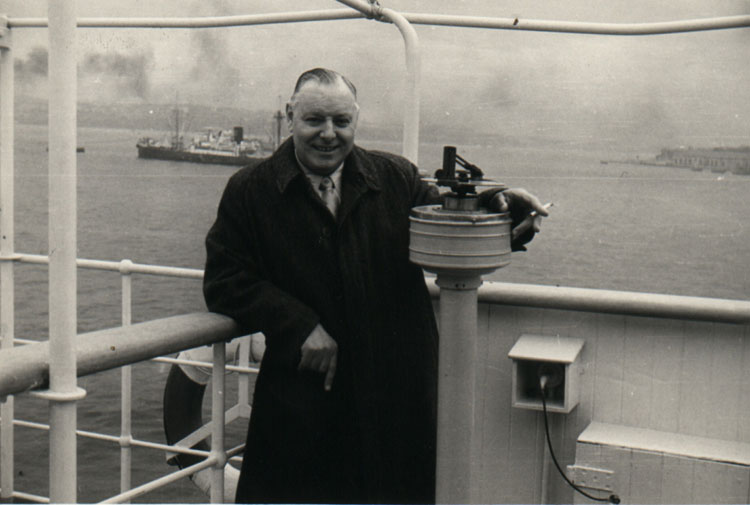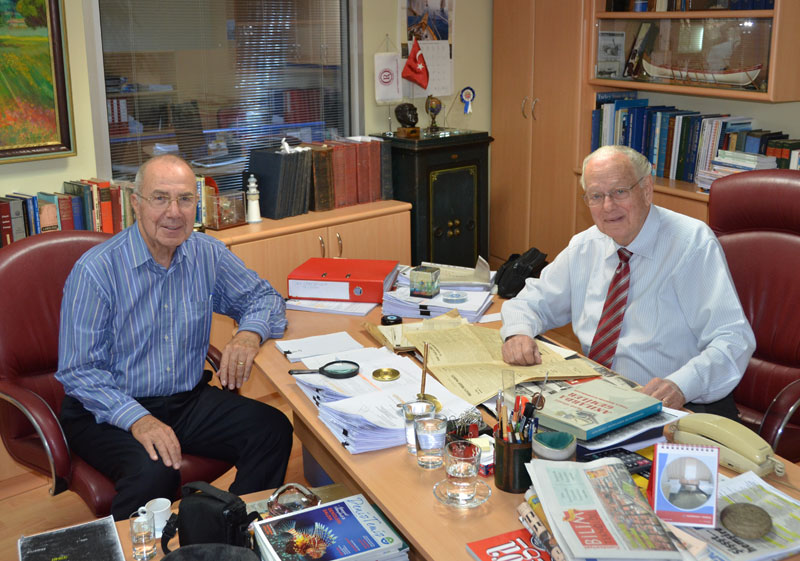The Campaner Family of Istanbul - Osman Öndeş
Aldo Campaner has been a very close personal friend for many years and I am grateful for allowing me access to his family archives and recording the family history in Turkey. Aldo Campaner for years was the president of the Near East Maritime Agency and he describes his father with these words:
“My father Marcelo Campagner was the largest representative of the major shipping firms of Lloyd Triestino and Adriatica in addition to being the agent to the French Company Messagerie Maritimes. The Shipping Chamber in Istanbul was set up to coordinate the work of the various foreign shipping companies and agencies and set rules of conduct. At one time I was also admitted into the Chamber and the language of speech and writing was French. Later just the written records were done in Turkish. Within the Chamber there were British representatives as well, such as La Fontaine and Whittall, and Mac Carnik, the president of Charles Wilkinson.
In the early 1950s Cezmi Serter joined and I remember his father as the manager of the hire department at Denizcilik Bankası [Maritime Bank]. After Cezmi Serter I remember newly created Turkish shipping agencies, amongst them Nihat Bey, whose firm later closed. The foreign members of the Deniz Ticaret Odası [Maritime Chamber] saw the changed situation and decided the arrangement couldn’t continue as such, and an Armenian, Mr Mohak was elected president of the Chamber. His father in Ottoman times was head of the Supreme Court and the family were regarded in high-esteem and that favourable impression has continued since.
My father, Marcello Campaner came to Istanbul after World War 1, he had served for 4 and half years as an artillery officer in Italy. Indeed he carried the scar of a shrapnel wound on his forehead. In our house we still retain the officer’s cap still with a hole, he wore the day he got injured. He arrived in Istanbul aged 24, he grew to love Turkey and experienced the episode when Istanbul was under foreign occupation. He disapproved strongly of the behaviour of the British and French soldiers that humiliated the local population. Once when he ran to catch a tram in motion, he personally received a whip lash from a British officer.
He was soon well-known and well-liked by the Italian colony to such an extent that he was shown more respect than the Italian Ambassador. He gained this reputation through his character and willingness to help with problems. One day, 3 months after landing in the city, he witnessed a group of boy scouts parading in Taksim, a multi-national group, each with their own nation’s flag in front: British, French and Greek. However, there were no Italian scouts and no Italian flag! Marcello Campaner gets in touch with the Italian Embassy and creates the first Italian scout troop in Istanbul. Later this scout grouping turns into the local youth arm of the Italian Fascist Movement.
My father Marcello Campaner was the head-cashier of the company he worked for, while my mother’s father, Ludevico-Ludvig Casati was the son of an Italian émigré to Istanbul. My mother’s mother was of Croatian extraction. My grandfather, Ludvig Casati married an attractive Maltese girl. When he met her, he realised he would marry her and spend the rest of his life in Istanbul. Our house was in Tepebaşı, behind the former American consulate, on the side looking out to Şişhane / Golden Horn. The house stands no more, it was demolished and now an office building stands in its place. Me and my younger sister were born in this house.”
Aldo Campaner graduated from the Italian Lycee in Istanbul in 1942 and his father suggested he study law. For this he went to Italy by train during the height of WW2. He studied in the city of Padova and on 15th June 1943, for the summer holidays made his return to Istanbul. 15 days later Mussolini was captured and killed in a gruesome way, and the country entered a period of complete chaos. Eventhough Italy had signed a surrender agreement with the Allies, the country was still in turmoil and Aldo Campaner elaborates thus: “For this reason I could not return to Italy and so I applied to the law faculty in Istanbul University. There was a fantastic lecturer by the name of Prof. Ferit Beymen who was very helpful to me and in February was allowed to take some examinations, and was deemed successful so was accepted in the second year class and graduated in 1947. I had graduated, but still didn’t know what to do. On the other hand my father was the president of company [which one?] and the ships of Adriatica were beginning to call on Istanbul and Izmir far more frequently. My father wrote to the company to enquire if there was an opening for me. However the company had such strict rules that father and son could not work in the same firm. They indicated I could possibly work at the company’s headquarters in Italy. My father did this communication without letting me know. The interesting thing is I found all this years later going through his papers. My father asked if I wanted to work in Italy, at the head-office. I didn’t want to work in Italy and I had just left my position [how long?] with the Van der Zee Company. However my father had a close friend Pietro d’Andria. Mr d’Andria was a cousin of Rita Castelli, who in turn was the wife of the famous Orientalist painter Amadeo Preziosi. Pietro d’Andria was a manager in the Canacaris & Fils Shipping Agency and lived in Yesilköy [St. Stephano], like my father. In conversation my father had indicated he didn’t know what to do to find me work and Mr d’Andria stated I could work for Canacaris. I thus started my first agency work experience with this small outfit that mostly served Greek ship owners. In those years Greece was still reconstructing post-WW2 and for next-to-nothing bought the American built now redundant Liberty ships and used these to fill a great need in transportation of goods to the world’s ports, and the companies grew fast. So my first experience with ships were with these Liberty ships.
I had perfect English and Pietro d’Andria had a lot of energy and he set up a brokerage company in London and we started that line of business. Later we started finding cargo for Turkish ship owners and we were so successful that we became effectively a monopoly of all shipping brokerage in Turkey. D.B. Deniz Nakliyatı TAŞ had bought Liberty class ships, named Yozgat, Çoruh etc. and a few tankers. I thus entered the Turkish shipping sector as well. 1948 we were riding high on success and it was then I met up with İbrahim Kalkavan. His offices were in Kefeli Hüseyin Han and he worked with Ömer Zaimoğlu who started as a clerk, but was successful eventually being the head of his own shipping agency (Zaimoğlu Shipping Agency). All day long coded telegraph messages would come from London and the deciphering of these messages was a rigmarole. With these messages the owner of the company Apostolos Canacaris would instruct me to find ships for the stated cargoes. Apostolos (known as Apostol) Canacaris had no children and had few relations. Initially I was inclined to use the phone to find suitable ships, but Apostol would retort, “they have to see your face!” Indeed between 1948-1958 I would start each morning by visiting these ship owners. Amongst the ship owners I would call on regularly were the Kalkavan, Sadıkzade, Yelkenci in Sirkeci and Ruşen Sad. In 1958 Apostol Canacaris died of heart failure and he left behind a will. In this testament he decreed that the shares of the company should be shared by the managers. I was one, the others were Michel Karitopulos, Yanni Hedakis, who himself died a few years later and Peyo Vadka. I received 40% of the shares, his mother got 20% who despite her age was still in good health. Canacaris & Fils continued to grow and prosper.
The ports of Iskenderun and Mersin were served by subsidiary agents. For example, my father, for Izmir appointed the Italian, Dandonaki, who was the father-in-law of Lucienne Arkas. In those years Antalya was also a port of note. For Mersin he appointed Emilio Levante. I am not certain, but I think they were 3 brothers and of these Rinaldo Levante had moved to Istanbul and was engaged more in insurance. His son David Levante established a touristic passenger shipping agency named ‘Levante-Mar’, however unfortunately he later committed suicide. The other brother Alfredo Levante lived in Iskenderun and his son Edoardo Levante has also died, and his on in turn is Alfredo Edino Levante. These Levantines all worked as subsidiary agents to the companies my father represented, even when those ports did not have a decent harbour. Amongst the ships my father represented were the San Marco and San Gorgio whose chimneys sported the Venetian lion symbol. These ships called on Istanbul and Izmir and took on cargo. My father used to say dealing with passengers was extremely stressful and told me “If you take on a thousand tons of cargo, place it in the hold, everything is done. But if you take on 10 passengers, each person would have their own wishes and you couldn’t offend any of them!”.”
Quintino Fonzi Cruciani was amongst the founder members of the Vapur Donatanları ve Acenteleri Derneği [Ship Chandlers and Agencies Association] established in 1927, and was the owner of Fonzi Cruciani agency representing Societa di Servizi Marittimi. The address of this agency was Rıhtım Cad., Rıhtım Han, Kat.1, Karaköy. Quintino Fonzi Cruciani was born in Bari, Italy. The Cruciani family settled in 1870 in the Cihangir area of Istanbul. Quintino Fonzi Cruciani had one son and the company he represented, Società Italiana di Servizi Marittimi - Sitmar was established in 1913 as the Italian State Shipping Company. In 1936 in line with the Italian state naval policy, it was merged with Società Anonima di Navigazione Lloyd Triestino. The fleet of ships of this company that regularly called on Genoa, Izmir, Istanbul, Alexandria and Venice, included Albania at 4,041 dwt, built in 1897 by N. Odero fu A., Sestri Ponente. The largest ship of the company was Ausonia at 11,300 dwt, built in 1915 by Blohm & Voss, Hamburg and later under the same name, at 12,955 dwt, built in 1928 by Ansaldo SA. Sestri Ponente. In addition the ship named Constantinopoli at 4,041 dwt was built in 1898 at N. Odero fu A., Sestri Ponente, for the La Valeoce company. This ship was sold to Società Italiana di Servizi Marittimi in 1914 and retained its name, and in 1933 was scrapped.
During WW1 years while Quintino Fonzi Cruciani was the manager of this company, in 1935-36 he took on Marcello Campaner as his assistant. He was short and slender and when the company folded in 1937 he returned to Italy and his son for a while worked in an agency in Bari.
 |
 |